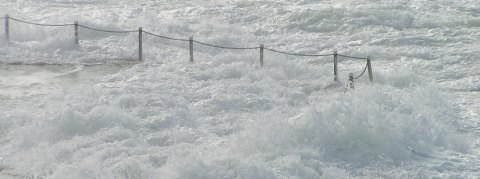Home | About CCW | Contact Us | Climate change Meaning | Causes | Solutions | Emissions | Carbon trading
How to reduce climate change
We really don't know how to reduce climate change.
It is tempting to insert a dot point list of all the best suggestions into a powerpoint slide as though we did have some actions we could take.
Popular as it is to say "yes we can", the reality can be a little trickier.
To begin with there are four important assumptions hidden in those five words, that:
- climate change has a magnitude
- the magnitude can be measured
- we have made the measurement(s) and so we know what the magnitude is
- change can be lowered
It is worth spending some time with each of these assumptions.
It is not easy to measure the magnitude of climate change. Mainly because direct observations of change require long time periods to detect any trend.
Variation is high even if there is an upward movement in the average of key indicators. The statisticians call this a signal to noise problem. When the run of data is short the noise can drown out the signal.
Modelling can get around the time problem, extending the observations over decades, even centuries. Only models generate predictions not measurements. So they reduce the noise but potentially introduce a spurious signal.
So knowing the magnitude of climate change has been hard to determine.
It is a huge call to say that climate change can be reduced.
Just because there is evidence for anthropogenic climate change , that humans have cleared land and burnt fossil fuels, released greenhouse gases and raised their concentration in the atmosphere, and likely triggered a warming phase, does not mean that this can be reversed.
It is a King Kanute problem.

Once the stone hits the surface of the pond the ripples are created and cannot stop until their energy is spent.
Climate change is like the ripples. The effect of a trigger must run its course.
Climate is a response the available energy in the thin habitable skin of the planet. Climate change happens when the energy balance is disturbed. It actually happens in a subtle way all the time. Bigger shifts are those we detect or predict as "climate change" in the context of the discussion here.
Such shifts are triggered by injections or loss of energy to the overall system. Only the consequences take a long time to disperse through the huge energy sinks of the atmosphere and oceans. The dynamics of these fluids and, especially, the great thermal inertia sees the ripple spread and remain visible long after the stone sinks.
It is prudent to remove the trigger as soon as possible.
Greenhouse gas emissions reduction make great sense as does the promotion of biosequestration .
However, these actions are only enough to slow emissions growth. Remember that economic growth is the route we are taking to support an expanding human population and economic growth will continue to correlate with increased emissions for some time.
Weakening the driver is the best we can do right now.
It is naive to think we can do more than alter the course of the warming phase at this time.

What can we do?
The solutions to climate change are not prevention but climate change adaptation. Some of the effects we might also be able to avoid with prudent planning of where and how we live, but mostly we will need plans to cope with the effects.
We adapt the way we grow our food, maintain our water supplies and design our cities.
Fortunately many people have been thinking about this need for sustainability and alternatives for a long time. We will look to these pioneers for inspiration.
So the first thing to do is gather the best sustainability ideas that we can use right away.
Do you have a climate change solution?
Do you have a great climate change or environmental solution?
Why not share it?
More on how to reduce climate change
Here are some more climate change wisdom pages relevant to the question of How to reduce climate change:
Anthropogenic climate change | Biosequestration | CCS | Climate change adaptation | Climate change predictions
Back to the top of How to reduce climate change | Return from How to reduce climate change to Solutions for global warming | Return to Climate-change-wisdom home page
Recent Articles
-
Reducing emissions while looking for solutions...
Nov 01, 15 04:46 PM
I've seen a lot of post's online for ideas on reducing emissions. The one suggestion I have not seen, is the most obvious. There should be a government -
Climate change evidence
Mar 24, 15 06:22 AM
Real climate change evidence has to demonstrate a change in climate. An extra sunny day or a severe storm or a flood is not enough. -
The climate change effect
Feb 19, 15 03:08 AM
What will be the climate change effect? There isn't one, there are many. Perhaps too many for us to understand.



New! Comments
Have your say about what you just read! Leave me a comment in the box below.